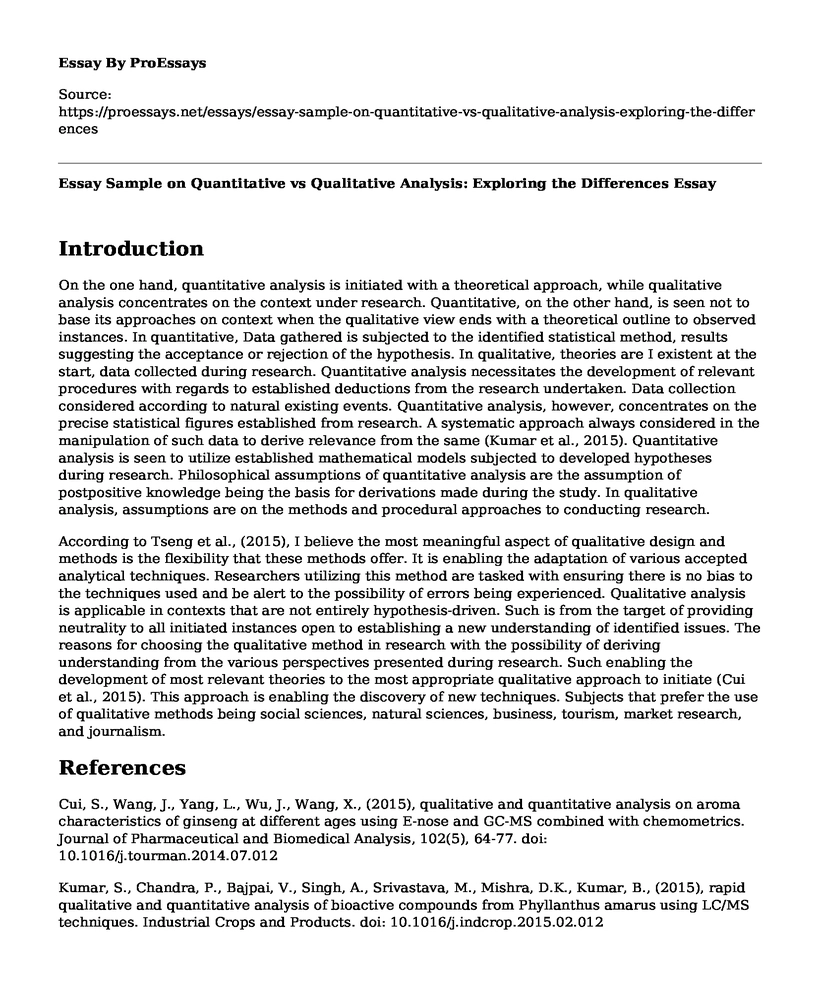Introduction
On the one hand, quantitative analysis is initiated with a theoretical approach, while qualitative analysis concentrates on the context under research. Quantitative, on the other hand, is seen not to base its approaches on context when the qualitative view ends with a theoretical outline to observed instances. In quantitative, Data gathered is subjected to the identified statistical method, results suggesting the acceptance or rejection of the hypothesis. In qualitative, theories are I existent at the start, data collected during research. Quantitative analysis necessitates the development of relevant procedures with regards to established deductions from the research undertaken. Data collection considered according to natural existing events. Quantitative analysis, however, concentrates on the precise statistical figures established from research. A systematic approach always considered in the manipulation of such data to derive relevance from the same (Kumar et al., 2015). Quantitative analysis is seen to utilize established mathematical models subjected to developed hypotheses during research. Philosophical assumptions of quantitative analysis are the assumption of postpositive knowledge being the basis for derivations made during the study. In qualitative analysis, assumptions are on the methods and procedural approaches to conducting research.
According to Tseng et al., (2015), I believe the most meaningful aspect of qualitative design and methods is the flexibility that these methods offer. It is enabling the adaptation of various accepted analytical techniques. Researchers utilizing this method are tasked with ensuring there is no bias to the techniques used and be alert to the possibility of errors being experienced. Qualitative analysis is applicable in contexts that are not entirely hypothesis-driven. Such is from the target of providing neutrality to all initiated instances open to establishing a new understanding of identified issues. The reasons for choosing the qualitative method in research with the possibility of deriving understanding from the various perspectives presented during research. Such enabling the development of most relevant theories to the most appropriate qualitative approach to initiate (Cui et al., 2015). This approach is enabling the discovery of new techniques. Subjects that prefer the use of qualitative methods being social sciences, natural sciences, business, tourism, market research, and journalism.
References
Cui, S., Wang, J., Yang, L., Wu, J., Wang, X., (2015), qualitative and quantitative analysis on aroma characteristics of ginseng at different ages using E-nose and GC-MS combined with chemometrics. Journal of Pharmaceutical and Biomedical Analysis, 102(5), 64-77. doi: 10.1016/j.tourman.2014.07.012
Kumar, S., Chandra, P., Bajpai, V., Singh, A., Srivastava, M., Mishra, D.K., Kumar, B., (2015), rapid qualitative and quantitative analysis of bioactive compounds from Phyllanthus amarus using LC/MS techniques. Industrial Crops and Products. doi: 10.1016/j.indcrop.2015.02.012
Tseng, C., Wu, B., Morrison, A.M., Zhang, J., Chen, Y.C., (2015), travel blogs on China as a destination image formation agent: A qualitative analysis using Leximancer. Tourism Management, 46, 347-358. doi: 10.1016/j.tourman.2014.07.012
Cite this page
Essay Sample on Quantitative vs Qualitative Analysis: Exploring the Differences. (2023, Mar 26). Retrieved from https://proessays.net/essays/essay-sample-on-quantitative-vs-qualitative-analysis-exploring-the-differences
If you are the original author of this essay and no longer wish to have it published on the ProEssays website, please click below to request its removal:
- Exploratory Research Example on Public Health Issues
- Quantitative Research Discussion Board
- Critique of a Qualitative Research: Preceptors and Patients
- Survey of Research Methods
- Cross-Cultural Quantitative Research
- What Is a SWOT Analysis?
- Paper Example on Capstone Research Techniques: Research Paper & Professional Products







